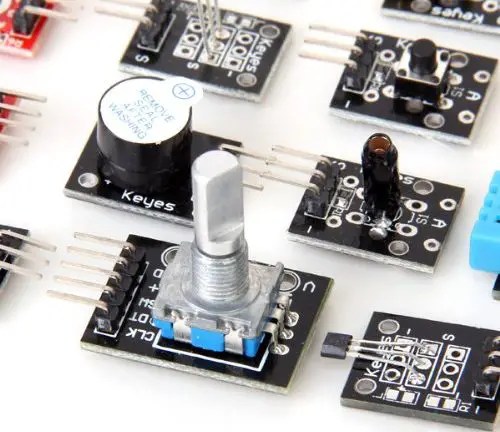
Here’s a nice post I discovered to get your money-spending fingers twitching. It’s a guide to 50 sensors and small peripherals that you can get that will work with the Raspberry Pi. Take a look here.

Here’s a nice post I discovered to get your money-spending fingers twitching. It’s a guide to 50 sensors and small peripherals that you can get that will work with the Raspberry Pi. Take a look here.

The Raspberry Pi Foundation has just announced the imminent availability of two online training courses that will help you get started with the Raspberry Pi and get a certificate at the end of it. The courses are:
They are both four-week courses and they commence on 20th February.
I think this is a great idea. It gives the opportunity for qualifications to all those teachers who aren’t able to (or aren’t released to) attend a full-on Picademy. It’s also great news for people like myself who help to run Jams but aren’t used to delivering workshops in a ‘teachy’ way.
For the full announcement, go to the Foundation website.
We are pleased to announce that spectator tickets for Pi Wars, the Raspberry Pi Robotics Challenge Competition, are now available.
Following the success of previous events, the competition is running for two days this time (1st-2nd April).
On the first day, over 30 school teams will compete against each other. On the second day, over 30 teams split into Beginner, Intermediate and Pro/Advanced categories will battle it out. There are seven challenges and taking part in each challenge will earn points that will be added together to see where the teams sit in the overall ranking.
For more information about the competition, see the Pi Wars website.
Tickets to watch the event
Spectator tickets are available by clicking the green TICKETS button on Eventbrite. Those aged 16 and under go free but must be accompanied by an adult. For those older than 16, day tickets are £5 each. If you are planning on attending both days, you can get a two-day ticket for £7. We would ask that you strongly consider being a Judge or Jam Maker (Marshal). It’s great fun, will only take an hour or two of your time, and your entry is FREE as a reward for helping us out! See below for more details!
Judging and Jam Making
Judges will be given instructions on how to judge a challenge and score sheets to fill in. You basically need to be fair, consistent and diligent. It’s one of the more fun ways of being involved with the event.
Jam Makers will be doing various jobs such as manning the front desk, collecting score sheets from Judges and being a point-of-contact for attendees with questions. Again, it’s a fun way of getting involved!
Any questions?
If you have any questions about the event or tickets, please get in contact with Mike via the Pi Wars website!


Jaret Burkett from Texas has taken an old television and placed it behind a fire grate. He’s then hooked up a Raspberry Pi to the TV, downloaded a fireplace video from YouTube and then looped it on the Pi. The result is terrific – a Raspberry Pi Fireplace! See how he did it here.

We had a good Jam on Saturday at the Institute of Astronomy. Andy Batey has been hard at work editing the talk videos and uploading them and I’m pleased to say that he’s beaten his record for getting them onto YouTube! So, head over to our YouTube channel to watch the talks such as the excellent Pi-powered skateboard talk as featured below!

Based in the small town of Shtime, British Engineer Andy Moxon runs a club called Young Innovators. The club “aims to bring to life maths and physics, while also teaching the students programming and robotics”. He’s currently preparing his two classes for the Kosovo equivalent of Pi Wars that will be happening in December! The classes have developed lots of robots with 3D printed chassis and you can see some of their progress in the video below. Read more over the Raspberry Pi Foundation.